- Home
- Nawal El Saadawi
Zeina Page 11
Zeina Read online
Page 11
His eyes fell on her as she sang and danced. They caught sight of her graceful, slender body and her long, slender legs that ended in taut thighs resembling those of a tiger. In her there was a touch of overwhelming masculinity merged with soft femininity. Her breasts, which were as firm as rubber, moved underneath the white cotton dress with the rhythm and cadence of the music. She was like a wild, unruly mare that no one could possess. She moved her arms and legs freely in the air, jumping, bending like a soft blossoming twig. Her voice rose high without barriers or restrictions from earth or sky, and her large blue-black pupils gave forth a dark bluish flame that was unafraid of hell fires.
The seat next to him was occupied by Safaa al-Dhabi, the friend of his cousin Bodour. She stared at him because he looked like her former Islamist husband. She could almost read his thoughts. She even detected the quiver in his fingers that held the rosary. Her eyes pierced through him like the edge of a razor, shaving off his beard and his moustache and removing his pubic hair to see what lay underneath. She had extensive experience of men. They came in all shapes and views and attitudes. They flaunted rightist or leftist slogans, engaged in cock fights on radio and television, went to the mosque without performing ablution first, stood behind the president or the minister in the second, third, fourth, or even first row. They would hear their knees creaking during prayers, or their stomachs rumbling with envy and admiration. A fart might escape, producing a soft sound like stifled snoring during sleep or of bare feet tiptoeing at night.
Safaa al-Dhabi’s mind travelled back in time and recalled her former husband, who said to her, “I admire your writing, Safi!” Like Bodour, he used to call her “Safi”. Like the other women writers, and critics of her colleagues, she was proud of her intellect. So if a man praised her lips or breasts, she would look daggers at him.
“I’m not a piece of flesh, sir. I’m a thinking human being and a writer. Have you read my book on literary criticism? Don’t you read my articles in the paper?”
Safi let out a resounding laugh and her short, fat body shook. She started wearing the white scarf around her head to repulse men’s eyes. She had vowed everlasting fidelity to her husband, and he swore by the Qur’an that he wouldn’t touch another woman.
Safaa al-Dhabi was preparing to write a critical book on the theater or the cinema. But her husband said to her, “Write about women’s rights in Islam! What’s the point of criticism? It’s all nonsense, Safi! We don’t have any theaters, cinemas, literature, or culture in our country. It’s all copied from the West. Art in our country is nothing but pornography and lewdness. Write on Islam, Safi, for Islam will solve all our problems.”
Safi prepared to write the book and collected the necessary references and materials. She created the table of contents and wrote the chapter headings. She gave the book the title Women in Islam, which she wrote in large font on the cover of a green folder. She spent hours working on her papers, staying up late at night sitting at her desk until she was overcome by sleep. She then closed her folder, stretched her limbs, and walked to her bedroom, where the wide bed which she shared with her husband stood. Before getting into bed, she would take a shower in order to wash away the dust and the exhaustion.
She had an apartment on the ninth floor on al-Agouza Street. The water supply was often cut off at certain times of the day and night, because the lower floors used all the water before it could find its way to the higher floors. So an electric pump was installed to push the water up. But the electric power was sometimes cut off during the night. The air was filled with dust and smoke, and a black cloud covered the sky. Lidless rubbish bins stood in front of apartment doors, and cats and cockroaches played hide-and-seek there. The water pipes and sewage pipes sometimes burst at the same time. Car wheels were submerged in the water and the traffic came to a halt.
On the front door of the building there was a large plate with the words “Piety and Faith Building” in large font. Even buildings had convictions. The owner of the building was a man who had a money investment company as well as an Islamic bank. His photograph appeared in the papers, with his beard, moustache, rosary, and the prayer mark on the forehead. He appeared in pictures shaking the hands of ministers, ambassadors, eminent writers who had their own columns in government papers, and university professors, including Safaa al-Dhabi and her ex-husband. Both of them had no other income than their monthly salaries, payments for lectures delivered in oil states, royalties on books and articles written about Islam, textbooks sold to university students, and private coaching in religion, jurisprudence, and Islamic law. At the bank, or perhaps at an Islamic investment company, they had accounts running into thousands. Even money had religious persuasions. Safaa al-Dhabi objected to usury but she accepted interest under the guise of money investment.
From the window of her apartment on the ninth floor, Safaa al-Dhabi looked up toward the sky, but her nostrils were assailed by the smell of sewage wafting from the street, and her ears were deafened by the blaring noise of loudspeakers. So she closed the double-glazed window the whole day, in an attempt to stop the flies and the calls to prayer from coming through. At night, she also closed it to stop mosquitoes and little flying gnats. She sometimes opened the window for a bit of fresh air, but the air was non-existent and the smell of sewage and accumulating rubbish was unbearable. Although she covered herself with the blanket from head to toe, she was still attacked by mosquitoes and gnats. A black cockroach ran underneath her head. She sprang to her feet, holding a slipper in hand to hit it. But it was more agile and won the battle by disappearing into a chink in the wall, leaving her panting, sweating, and cursing life. She lay next to her husband, looking enviously at him, for he slept soundly, undisturbed by anything. Should the war break out or the building shake, he would not budge.
From a distance, a sound like the cheering of demonstrators came to her. People were going out on protests: laid-off workers, unemployed youngsters with university degrees, women in black gowns and slippers, street children, beggars of both sexes, handicapped people, and people maimed in war or peace.
From a distance, she could hear the rumbling, which was faint at first but grew louder with the break of dawn. The city seemed like a huge black animal that was waking up lazily, slowly, with withering eyes peering through the black cloud, or like a devout woman veiling herself from head to toe. The maid came to clean the house. She would hang the clothes on the line and beat the carpet on the balcony railing, the dust dispersing on the lower floors. The street began to wake up: grocers, hairdressers, pharmacies, plumbers, cafés, and restaurants on the Nile front and under the bridges, police stations, pubs, courts, schools, educational institutions, and mosques. Safaa al-Dhabi put the kettle on while her husband smiled in his sleep, for he no longer smiled at her. He turned his back to her and fell fast asleep. He was short and stout, and she liked men who were tall and graceful. His face was plump, and she liked lean faces. His voice was extremely masculine, and before marriage he told her, “I like your writing, Professor.”
He stressed the “f” while pronouncing “Professor”. He thought everything about her was beautiful, even her round nose. He told her that her unique nose set her apart from other women. He saw all her faults as marks of distinction. The difference in opinion between them was natural and healthy. It was in keeping with the democratic spirit of Islam.
“I believe in pluralism, Safi, for differences enrich life. If God wanted to create all humanity as one faction, He would have easily done that. But He created people to be different. Islam is based on reason, Safi!”
He read out an article he had written for the Islamic Newspaper. At the start of the article he wrote, “In the name of God, the Merciful, and Most Compassionate, Islam is distinguished from other religions by its reliance on reason and intellect. It is true that veiling is the duty of a Muslim woman to ward off temptations, but menstruation is not evil or unclean. A woman can hold the Qur’an in her hand and read during menstruation. As for m
arrying a person who had nursed from the same mother’s milk, it isn’t forbidden, because it is not logical. If a child nurses from the breast of a woman, he should not be prevented from marrying a girl who nursed from the same breast. How can we stop them marrying if their hearts are set on it?”
She dozed off while he was reading. His mind was filled with nothing but menstruation, childbirth, and breastfeeding. He grew angry when he noticed her falling asleep.
“Naturally you don’t like my writings. These are the same writings that you liked before we got married.”
“Do you mean you like what I write? You used to like them before we got married, and you used to say, ‘I like your writing, Professor’, stressing the ‘f’.”
“What do you mean I stressed the ‘f’? How dare you?”
“How dare YOU?”
There was havoc after her husband’s article was published. Ahmed al-Damhiri was hugely upset.
“This is heretical talk. This man is objecting to God’s words in the Qur’an. If there is a clear text, we cannot improvise or innovate. There is a text saying that menstruation is evil, that men should not go near women until they are purified of this evil ...”
Ahmed al-Damhiri didn’t know the verse concerning menstruation by heart, but he was certain that that the word “evil” was mentioned in the Holy Book. In addition, there was a saying by the Prophet (may peace be upon him) which forbade the marriage between children who suckled together, which he did not recall verbatim, but the gist was clear.
Next to her sat Ahmed al-Damhiri, his eyes following Zeina Bint Zeinat and her every move.
“This girl was a child only yesterday. Today she’s a woman, a luscious female. Girls grow at the speed of lightning, and their breasts grow almost overnight.”
He closed his eyes, imagining her in his arms, seeing her underneath him in bed. He would have her, no doubt, for he never desired a woman but had her in the end. God had made slave girls and concubines lawful for all men, and for him as an emir, no doubt!
The emir had a mysterious power, which he called the power of God. He used to meet the officials of the government in secret, and oppose its policies in the papers, pretending to be its enemy. He received money and arms from abroad, and hired fighters for God from everywhere. He had assistants in government offices, schools, universities, unions, courts, and ministries. He had eyes in all establishments, even the police and the security apparatus, and in nightclubs and brothels.
One of the emir’s men filed a suit against both Safi and her husband. She had made a statement supporting her husband’s view that menstruation was not an evil visited on women, and that Islam in essence respected them. Menstrual blood was similar to other types of human blood. As such it was sacred. Without women, there would have been no humanity. The legal charges directed at both of them were the following:
Contempt for the word of God.
Straying from the Islamic faith.
Denying the accepted axioms of religion.
Profanity.
Intellectual men and women were split in two, for while some, led by Ahmed al-Damhiri, sanctioned the charges, others, led by Bodour and her daughter Mageeda, attacked them. The whole thing ended when the case was shelved, which meant a state of neither acquittal nor conviction. The case remained unresolved, stashed in one of the drawers. It would stay there until the government saw fit to reopen it and bring it back into the light.
Contradictory currents and views often coexisted in the same family. The pious father would have an atheist son, and the Muslim mother’s womb would bring forth a Marxist daughter. A brother would be on the side of the government, while his sister would be on that of the opposition. But blood was always thinker than water, and families were united during funerals and weddings. They exchanged kisses and hugs, then returned to the arena of conflict and dealt blows to one another, above the belt as well as below it.
It was natural for Ahmed al-Damhiri to attend the birthday of his cousin’s daughter, Mageeda Zakariah al-Khartiti. Bodour’s image had been in his dreams throughout adolescence. Her daughter, Mageeda, was a rising writer with her own column in the Renaissance magazine. He wished to show her the righteous path of Islam. Her father had a permanent column in the Sphinx newspaper, and he swayed between science and religious faith. Ahmed al-Damhiri wanted him to become an asset to Islam, for religion needed the protection and support of worldly power, such as the power of money, arms, and the media.
Ahmed al-Damhiri taught political sociology at the American University, for he spoke English and French, and travelled to Paris, Washington, and London to attend religious conferences. He swam like a fish in seas and oceans, and established a company specializing in publishing religious books, manufacturing censers, rosaries, and charms. It supplied arms and audio-visual transmission and reception equipment, and exported salted fish, sardines, and pickles, in addition to translating the Qur’an to the various languages of the world.
“Hello, Ahmed. Lovely to have you at the party!”
“Lovely to see you, dear cousin Bodour!”
“Hello, Uncle Ahmed.”
“A very happy birthday to you, Mageeda, and many happy returns!”
“Thank you, Uncle.”
“I follow all your writings. Bravo, Mageeda. But I wish one day you would write more on Islam and religious matters. The hereafter is more permanent than this world, Mageeda!”
His eyes followed the movements of Zeina Bint Zeinat. She played the piano, sitting on the backless stool with her back upright. He saw her profile, her hair raised high like a crown on her head, her complexion tanned by the sun, her long, graceful fingers speeding like fingers of light over the keys of the piano. All the eyes in the hall gazed at her, and the voices were drowned by the music.
“Is Zeina your friend from long ago, Mageeda?”
“From my school days, Uncle.”
“Try to advise her, Mageeda, to go back to God!”
“My friend Zeina is a decent young woman, Uncle. Her life is given completely to art, music and sing—”
“All these things are forbidden, Mageeda.” “
Why forbidden, Uncle?”
Safaa al-Dhabi turned to them, chipping in, angrily whispering, “Why forbidden, Mr Ahmed? Beautiful art is a gift from God, for God is beautiful and He loves everything that is beautiful. Isn’t that right, sir?”
“Can we stop talking now please and listen to Zeina?”
It was Bodour’s voice. Sitting in the chair behind her friend Safi, she was worried that the jolly atmosphere might be ruined. She didn’t want her cousin, Ahmed al-Damhiri, to create bad vibes, for she knew him well from childhood. He wouldn’t keep quiet until all eyes were on him. He expected Bodour to introduce him to her guests. He expected them to look at him with awe when they realized that he was present. But he had to sit like all the other guests, a nonentity, in spite of being an emir, a star who was recognized everywhere, a god or a demi-god in the eyes of his followers.
He fidgeted in his chair, wavering between staying and leaving. But he changed his mind once Zeina Bint Zeinat started to sing, her voice producing a mysterious electric charge inside his body. His whole being quivered, wiping out old sorrows. His lustreless eyes began to gleam. Zeina stood in front of the piano facing the audience in the large hall sitting in rows, their eyes fixed on her. She saw the face of her mother, Zeinat, sitting in the last row next to the servants and cooks. Her eyes twinkled with tears. She left her place on stage and went to her, passing through the rows with her head held high, as she used to do between the rows of girls at school twenty, thirty or a hundred years earlier. The past seemed to have happened only yesterday. She embraced her mother and walked back with her between the rows, climbing with her the few steps leading to the platform. She bowed with natural pride in front of the audience and said, “I dedicate this song to my precious mother, Zeinat. She’s more precious to me than the earth and sky, than this world and the hereafter.”
&nbs
p; Bodour al-Damhiri looked down, swallowing her tears in silence.
Ahmed al-Damhiri fidgeted in his chair. “This girl is blasphemous, what does she mean by better than the earth and sky? There is nothing better than the hereafter, you infidel!”
The words passed through his head, but he said absolutely nothing. The hall became totally silent, then the band began to play. The children were now young men and women, having climbed high in the world of music and art together with Zeina Bint Zeinat. Miss Mariam had trained them, day in day out, month in month out, until Miss Mariam’s band became famous all over the country. Miss Mariam sat next to Mageeda al-Khartiti. Her face lit up when Zeina Bint Zeinat pointed at her and took her to climb the platform with her. She introduced her to the audience, standing between her and her mother Zeinat.
“Miss Mariam is my second mother, for she was the one who taught me to love music and singing. She trained us and took us from the street to the world of art. We called our band the ‘Mariam Band’ and we had no place except the streets, with their dust, women, men and children, with their demonstrations and cheers, ‘Down with injustice, and long live freedom’. The streets inspired our tunes and music and rhythms. We drew music from the streets, from the pavements, and the dust, from people’s warm breaths on earth and not from the coldness of the sky.”
When she spoke, her voice sounded melodious. Her large pupils sparkled and her warm voice touched the hearts of the audience, transforming sorrows to innocent joy. The simple words came as naturally out of her chest as her breath. Everything around her seemed natural, though a little peculiar.
Ahmed al-Damhiri trembled in his chair. “This woman is not a simpleton. She is dangerous, for she plays with words. What does she mean by the coldness of the sky? This is heretical talk.”
This was how he spoke to himself.
The hands in the hall clapped, and the sound of applause drowned out all other noises. Some of Ahmed al-Damhiri’s aides were sitting in the back rows or standing in the aisles, for the emir never went out without armed guards in plain civilian clothes: white gowns or khaki suits. Inside the pockets of each of them was a silent gun. Although their heads moved in every direction, their eyes remained set on him, for they saw nobody but him, even when the hall was full of people. They heard only his voice, even when other voices rose high or the music played and the singing began. They saw him tremble in his chair and mutter under his breath. His muffled voice might have been lost in the sound of clapping, but they were trained to read his lips, and their muscles moved in unison with them. Then there was silence, and Zeina Bint Zeinat went back to playing and singing.

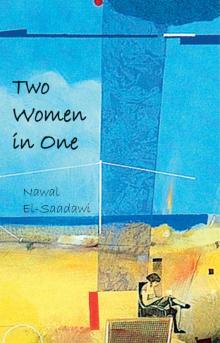 Two Women in One
Two Women in One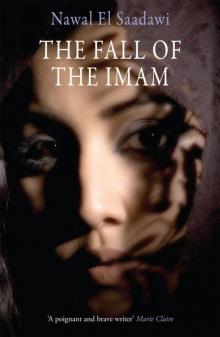 The Fall of the Imam
The Fall of the Imam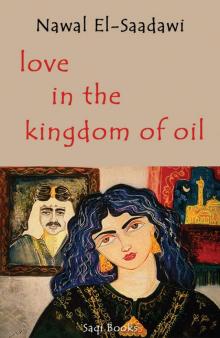 Love in the Kingdom of Oil
Love in the Kingdom of Oil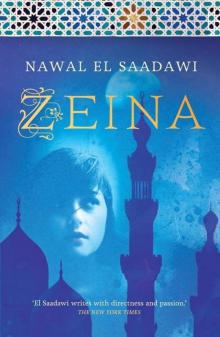 Zeina
Zeina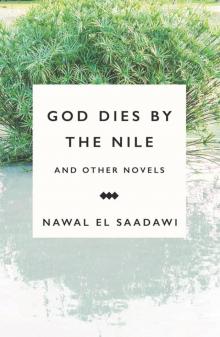 God Dies by the Nile and Other Novels
God Dies by the Nile and Other Novels